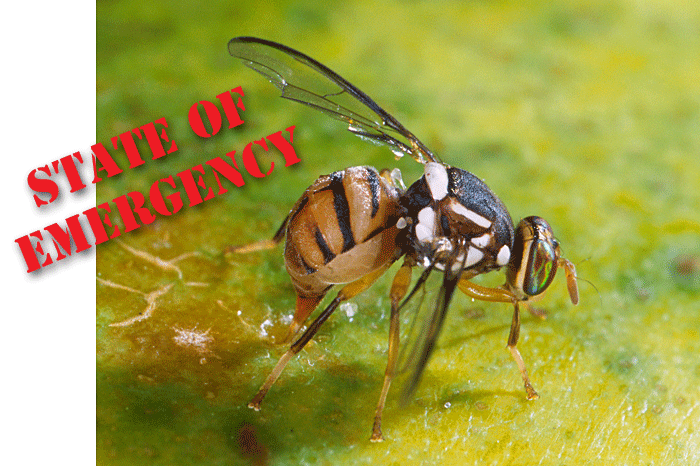Florida Department of Agriculture works to eradicate pest in Miami-Dade
AN AGRICULTURAL STATE of emergency is in effect now in Florida because of Oriental fruit fly infestation, and Commissioner of Agriculture Adam H. Putnam says an aggressive fight is under way to ward off the devastating pest.
Since the Oriental fruit fly was first detected in Florida on August 26, Putnam’s office reports, 164 more have been identified in south Miami-Dade County. That makes this the largest infestation of the Oriental fruit fly — Bactrocera dorsalis (Hendel) — in Florida’s history.
The first fly was discovered during routine trapping, and more were found during expanded trappings. The state department, along with the U.S. Department of Agriculture, monitors more than 56,000 fruit fly traps in Florida as an early detection network. It is an ongoing effort to ward off the exotic fruit fly introductions that could do tremendous damage to the state’s agriculture industry.
“The infestation threatens the area’s ability to produce the fruit and vegetables the nation has grown to rely on during the winter months, the region’s overall economic health, and the thousands of jobs that rely on this industry,” Putnam wrote in a letter to constituents. “Miami-Dade County is the state’s leader in the production of tropical vegetables, tropical fruit, and ornamental nurseries; and overall agricultural production generates more than $1.6 billion in annual economic impact and supports more than 11,000 jobs.” Trapping, treatment, and regulatory teams are working in areas around the positive finds to limit the impact of the flies.
Putnam traveled to the Miami-Dade area in late September to address the crisis. “I appreciated the opportunity to hear from growers and others impacted by the infestation,” he said in an official statement. “We’ve implemented an aggressive eradication program, and we will use every weapon in our arsenal that’s necessary to eradicate this pest and protect Florida’s $123 billion agriculture industry and the two million jobs it supports.”
The Oriental fruit fly feeds on 430 different commodities, infesting fruits, vegetables, and nuts. The Florida Department of Agriculture and Consumer Services (FDACS), in partnership with the USDA, established a quarantine zone to limit movement of products that may carry the Oriental fruit fly. Traps were also set to attract and eliminate males, and treatments were applied to areas where Oriental fruit flies have not been found.
The infestation is of such great magnitude, the FDACS has begun aerial spraying — deemed necessary to ensure the success of the eradication effort. The spraying measure is being conducted with the assistance of Miami-Dade County.
FDACS has set up an Oriental Fruit Fly Helpline to help combat the infestation: (888) 397-1517. Further information and regular updates can be found at www.freshfromflorida.com.
CREDITS
article by MARY TOOTHMAN
photo by SCOTT BAUER, USDA

